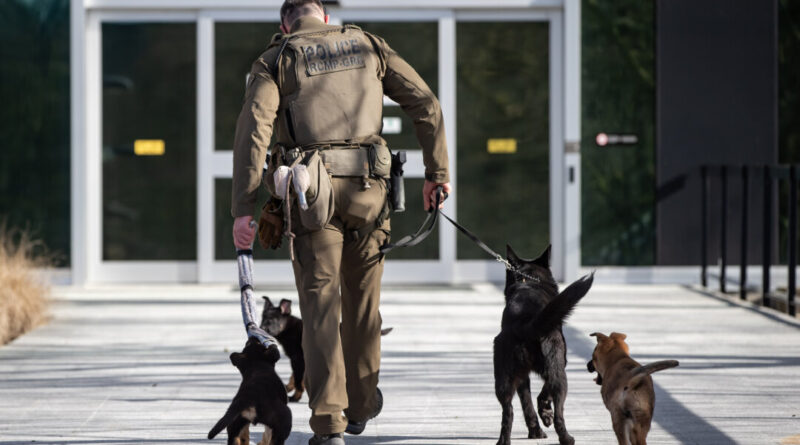Concerns about the RCMP Police Dog Program’s health and wellness risks highlighted in evaluation
The RCMP’s police dog training centre has been facing challenges such as staffing shortages, low morale, and rundown facilities that pose health risks to officers and canines, according to an internal review.
An evaluation of RCMP police dog services highlights various difficulties in the program that provides and trains dogs to protect VIPs, assist emergency teams, and detect suspects and illicit substances.
Reviewers analyzed the management and delivery of the force’s police dog services from 2018-19 to 2023-24, based on interviews and a survey conducted in RCMP divisions and the training center.
The evaluation revealed that the dog services, established in 1935 with the RCMP’s first puppy acquisition, were highly valued by front-line members.
Due to cost and demand for German Shepherds, the RCMP has developed its own breeding program.
Imprinting starts when a puppy passes a seven-week test and is paired with an RCMP member aspiring to be a handler and has completed a specialized course.
Training, which usually starts when a dog is between one and two years old, aims to create a cohesive unit between the handler and the animal.
The breeding program plays a crucial role in providing an adequate number of dogs to support the program, according to the reviewers.
Nevertheless, several challenges were identified, including the extended imprinting process, insufficient resources for imprinters and training support, limited course availability and variety, as well as inadequate infrastructure at the training center.
During the assessment period, only 17 out of 26 positions were filled at the training center. Some staff members stated that even with a full team, additional positions are required to meet the demands of front-line policing.
In 2005, the center had seven trainers and 125 dog teams in the field. By 2022, there were eight trainers and 157 working teams.
Some interviewees mentioned the shortage of dog handlers to cover holidays, time off, training, or absences due to illness. Dog handlers often took their equipment and dogs with them on vacation to ensure their availability when needed.
“The working conditions and infrastructure at the training center pose significant health and safety risks to employees and dogs,” the evaluation states.
It highlights an audit from early 2023 that found deficiencies in 11 out of 13 psychological factors essential for a healthy workplace at the training center.
The evaluation supported these findings, with interviewees expressing feelings of being overworked and lacking control. They also pointed out poor communication and cited program management as a factor contributing to low morale.
Many handlers refused to house their police dogs at the Police Dog Service Training Center in Alberta due to stressful kennels and potential health hazards they posed.
Some stressors included limited natural light, the inability for dogs to go outside, and loud noises during feeding and cleaning times. Possible hazards mentioned were choking risks from peeling flooring, lead poisoning from paint flakes, and respiratory issues due to poor ventilation.
Service teams also faced health risks in the field.
Members attending high-risk calls, often alongside emergency response teams, lacked essential safety equipment like night vision goggles, ballistic helmets, and protective masks, as per the evaluation.
In addition, handlers reported working excessive overtime and being frequently on call.
“Interviewees mentioned that the job negatively impacts their physical and mental health, suggesting that access to psychologists familiar with their stresses would be beneficial.”
The evaluators proposed several recommendations to address health and safety concerns, program policies, reporting structure, sustainability, and training.
An RCMP management response included in the evaluation outlined various planned actions in the upcoming year and beyond to implement improvements.





